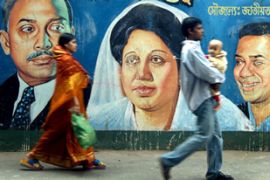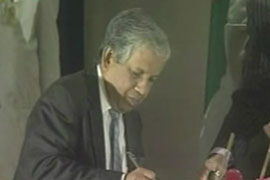Bangladesh interim cabinet sworn in
Police release a statement saying over 2,500 people were arrested on Friday.

Iajuddin Ahmed, the president, resigned on Thursday as head of the caretaker government in charge of holding parliamentary elections on January 22.
| See also |
The authorities had earlier lifted a curfew imposed two days ago as part of the emergency but the capital Dhaka‘s streets remained almost deserted.
“Over the past six months, political instability has cost us millions of dollars in export orders. Our exports were on the brink of disaster,” said Fazlul Haque, the president of the country’s biggest export group.
“Political animosity, mistrust and violence have made life miserable for the people and made the future of democracy uncertain,” Iajuddin Ahmed said in a televised address late on Thursday.
On Thursday, the UN announced it would suspend all technical support for the elections while the European Commission suspended its observation mission to the polls due on January 22.
At least 45 people have been killed and hundreds injured in violence since Begum Khaleda Zia of the Bangladesh Nationalist Party stepped down as prime minister in October at the end of her five-year term, handing power to the interim authority which was charged with organising polls.
UN reaction
Before the president announced on Thursday his resignation as head of the caretaker government, Ban Ki-moon, the UN secretary-general, said the situation had deteriorated to the point that the US-based National Democratic Institute for International Affairs and the International Republican Institute were refusing to monitor the elections.
 |
| Fakhruddin Ahmed has taken charge at a critical moment in Bangladesh’s history [AFP] |
“The political crisis in Bangladesh has severely jeopardised the legitimacy of the electoral process,” he said in a statement released on Thursday in Dhaka.
“The United Nations has had to suspend all technical support to the electoral process, including by closing its International Coordination Office for Election Observers in Dhaka.”
Technical support includes consulting and advice on publishing results as well as ballot casting and counting.